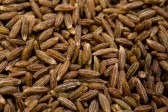Cumin

Cumin Seeds
Cumin seeds are similar to fennel seeds in appearance, but are smaller and darker in colour. Cumin seeds are used as a spice for their distinctive aroma, popular in Indian, and Yarlpanam cuisine among so many others. It is used as an ingredient of curry powder. Cumin's distinctive flavour and strong, warm aroma is due to its essential oil content.
Culinary Uses:
Cumin is used mainly where highly spiced foods are preferred. It is an ingredient of most curry powders and many savoury spice mixtures. Jeera pani is a refreshing and appetising Indian drink made from cumin and tamarind water.
Medicinal Uses:
Cumin is diuretic, carminative, stimulant, astringent, and antispasmodic. It is valuable in treating dyspepsia, diarrhoea, hoarseness, and may relieve flatulence and colic. It remains a traditional herbal remedy in the East. It is supposed to increase lactation and reduce nausea in pregnancy and hence in Yarlpanam, it is an essential ingredient in the special curry powder (charakku) that is used during pregnancy and post natal periods. Cumin tea is also believed to help induce labour in a woman who has gone post-dates with her pregnancy. Used as a poultice, it relieves swelling of the breast or the testicles. It is smoke in a pipe with ghee to relieve the hiccups. Cumin stimulates the appetite.
It is also commonly used in traditional Brazilian cuisine. In herbal medicine, cumin is classified as stimulant, carminative, and antimicrobial. In Sri Lanka, toasting cumin seeds and then boiling them in water makes a tea used to soothe acute stomach problems.




